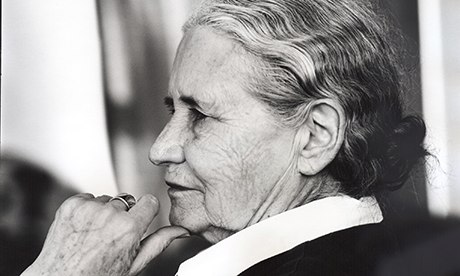Doris would invite herself to lunch with me in Hampstead, when the mood took her. I never dared to say no

Doris Lessing. Photograph: Eamonn McCabe for the Guardian
I remember very clearly how I met Doris. I took the initiative, which was very uncharacteristic for me. I wrote to her in the late 1960s, out of some kind of desperation, and she very kindly asked me to lunch. I had just read The Golden Notebook, which prompted my attempt at contact, and I was overawed by her. I didn't pursue the friendship very vigorously until some years later, when somehow, slowly, a different pattern established itself between us. She gave large parties, to which I was invited, and for which she did her own cooking – great casseroles and pots and bowls of food, what she called the farmer's food of a farmer's daughter, which we ate sitting on the floor or perched on the arms of chairs. She was a good cook, and enjoyed seeing other people eat and drink. Her company was miscellaneous – African writers and politicians, feminist publishers from the antipodes, people she'd met at a Russian evening class, scientists, novelists, playwrights, poets, journalists, campaigners, translators, an old lady who lived down the (rather shabby) street. We all mixed in comfortably together. A cat or two would perch itself amid the throng, soliciting attention. Doris loved cats, and wrote a book about them. Some of them were strays that had wandered in, found a good welcome, and stayed. I once saw Doris's grand American publisher Bob Gottlieb giving one of these intrusive cats a very hostile and suspicious look. I think he thought they'd got the upper hand and he feared for Health and Safety.
Doris would invite herself to lunch with me in Hampstead, when the mood took her. I never dared to say no. Hers was a royal command. Even if I was frantic with children's activities or deadlines, Doris had to be accommodated. So I would drop everything and cook for her – soup, chicken casserole, fish stew. I know I wasn't the only person to whom she issued these decrees.
I remember one occasion when Doris invited herself on the day when my cleaning lady was due to come. Mrs Van always came on Wednesdays, and I could not possibly have rearranged her. My cleaning lady was not only my cleaning lady, she was my surrogate mother. I loved and admired her, and I always cooked lunch for her. So there we were, at table together, Doris Lessing and Mrs Van and me.
We got on well. Mrs Van Blerk was South African Cape Coloured, and had come to England just after the war with her white Afrikaner husband and her three children, in flight from apartheid. (Her husband died shortly after their arrival, and she supported herself and her family for decades.) Doris had come to England from South Africa at much the same period, without her husband and with only one of her three children, in flight from her mother. These two wise, hard-working women exchanged notes and I listened. It was a historic conversation. I have forgotten what was said, but I remember the mood. After lunch, Doris and I went upstairs to hide in my bedroom with our coffee, to allow Mrs Van to carry on with her cleaning. I was in awe of both of them.
Doris would invite herself to lunch with me in Hampstead, when the mood took her. I never dared to say no. Hers was a royal command. Even if I was frantic with children's activities or deadlines, Doris had to be accommodated. So I would drop everything and cook for her – soup, chicken casserole, fish stew. I know I wasn't the only person to whom she issued these decrees.
I remember one occasion when Doris invited herself on the day when my cleaning lady was due to come. Mrs Van always came on Wednesdays, and I could not possibly have rearranged her. My cleaning lady was not only my cleaning lady, she was my surrogate mother. I loved and admired her, and I always cooked lunch for her. So there we were, at table together, Doris Lessing and Mrs Van and me.
We got on well. Mrs Van Blerk was South African Cape Coloured, and had come to England just after the war with her white Afrikaner husband and her three children, in flight from apartheid. (Her husband died shortly after their arrival, and she supported herself and her family for decades.) Doris had come to England from South Africa at much the same period, without her husband and with only one of her three children, in flight from her mother. These two wise, hard-working women exchanged notes and I listened. It was a historic conversation. I have forgotten what was said, but I remember the mood. After lunch, Doris and I went upstairs to hide in my bedroom with our coffee, to allow Mrs Van to carry on with her cleaning. I was in awe of both of them.
No comments:
Post a Comment